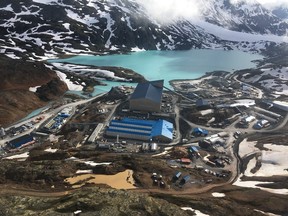B.C. has until March 26 to implement a new process for staking mineral claims that includes consultation with First Nations, but neither prospectors nor First Nations are big fans of the proposal to do so.

The province has released a draft of proposed new rules for staking mineral claims in B.C. that take into account government’s need to consult with First Nations, which has some prospectors raising the alarm that it will put a freeze on their sector.
Called the mineral claim consultation framework, the process is intended to meet government’s duty to consult First Nations, which a September 2023 B.C. Supreme Court decision ruled government was failing to do with its existing online system for registering claims.
Instead of letting prospectors automatically register their interest to explore for mineral wealth on specific plots of land, the draft process calls for prospectors to submit applications to stake claims, which would go through three steps of review, consultation with First Nations and accommodation before the province approves or denies a claim.
For a lot of prospectors that is too complicated a burden at the very start of the mining exploration process and has many contemplating stopping work in the province, according to prospector John Bakus.
“There’s no way we can continue work under the new rules and regulations,” said Bakus, who holds several claims. “When we’ve invested hundreds of thousands, if not millions of dollars, and they’re changing the game plan, (with) no guarantee of moving forward.”
Prospectors scour available geological data produced by the B.C. Geological Survey, Geoscience B.C. and the exploration reports of mining companies looking for spots that show potential for valuable mineralization such as gold, silver or copper.
Under the existing system, B.C.’s mineral tenures online portal, they have been able to automatically register an interest to start looking for more definite evidence that there would be enough of the metals to justify a mine. Most claims are gambles.
B.C. Supreme Court Justice Alan Ross, in his decision for Gitxaala vs. B.C., ruled that the automatic staking process set up potential infringements of Indigenous rights and title, which triggers a duty for the province to consult with First Nations before claims are registered.
From a First Nation perspective, Terry Teegee, regional chief for the Assembly of First Nations, said the positive development is that government and industry view it “as maybe an opportunity to reset” relationships with First Nations.
However, Teegee added that “I don’t think anybody’s happy, certainly our communities, with the (consultation framework).”
The Gitxaala, in their complaint, filed jointly with the Ehattesaht First Nation, said they had experienced prospectors, or so-called free miners, entering their territory without consulting them first.
Under the proposed framework, the consultation work is up to the Mining Ministry, but longtime prospector Hugh Maddin said the concern is that it still draws in the participants in the exploration process who have the least resources to deal with the legal issues involved.
“The complexity of it is all to be borne by the lowest common denominator, the prospector, who identifies the prospect,” Maddin said.
Maddin added that he has talked to about 10 colleagues who have told him “they’re going to leave the province (because) it’s just too complicated.”
The consultation framework doesn’t include a requirement that First Nations give their consent to the staking of claims, but the process does allow for accommodations for Indigenous interests before decisions on approval, or denial, of claims.
Teegee argued parties would be better off with more consultation earlier in the mineral exploration process.
“Before you put anymore resources and money into (a claim), get a good understanding if it is a feasible development,” Teegee said. “You’re saving everybody money and a lot of hard feelings.”
The head of the industry group that represents the mineral exploration sector, however, said there is “general support” for the consultation framework, “so long as it stays within the narrow scope of what it’s supposed to do.” That narrow scope is to keep the consultation process within the terms of Ross’s decision and not tie it to modernizing the Mineral Tenure Act, said Keerit Jutla, CEO of the Association for Mineral Exploration, B.C.
However, Jutla said AME B.C. opposes a requirement for consent at the staking stage due to the limited impact the activity has on the landscape.
“We need to ensure that they’re fair processes for everybody involved, that have clear timelines and certainty in regulatory and decision-making,” Jutla said.
Jutla said the industry found it “regrettable” that the province didn’t appeal the Ross decision to a higher court, but “we’re here now (at) the position where all parties understand that we have to do just what the case (determined).”
Discussion over the framework is also taking place against the backdrop of the province’s larger project of modernizing its Mineral Tenure Act to line up with the terms of the Declaration on the Rights of Indigenous Peoples Act (DRIPA).
Based on that, industry participants worry a de facto requirement for consent for staking claims will come out of the process.
Postmedia News has been provided with messages in an email chain that registers many of those concerns. In it, former B.C. Liberal mines minister Bill Bennett said “the concerning part” will be how DRIPA will be applied in the last two stages of the consultation framework’s process.
Bennett said that in his interpretation the process won’t be simply consultation, and will require consent before claims are staked, which he called “reckless” since no other Canadian jurisdiction has this requirement.
Teegee, however, argued that moving toward “consent-based decision-making is paramount for any project, mining or otherwise.”
“What’s the alternative? We go to court (and) then the judge, more often than not, says, ‘The court can only do so much, you have to work together and find a way to make a decision on this,’ ” Teegee said.